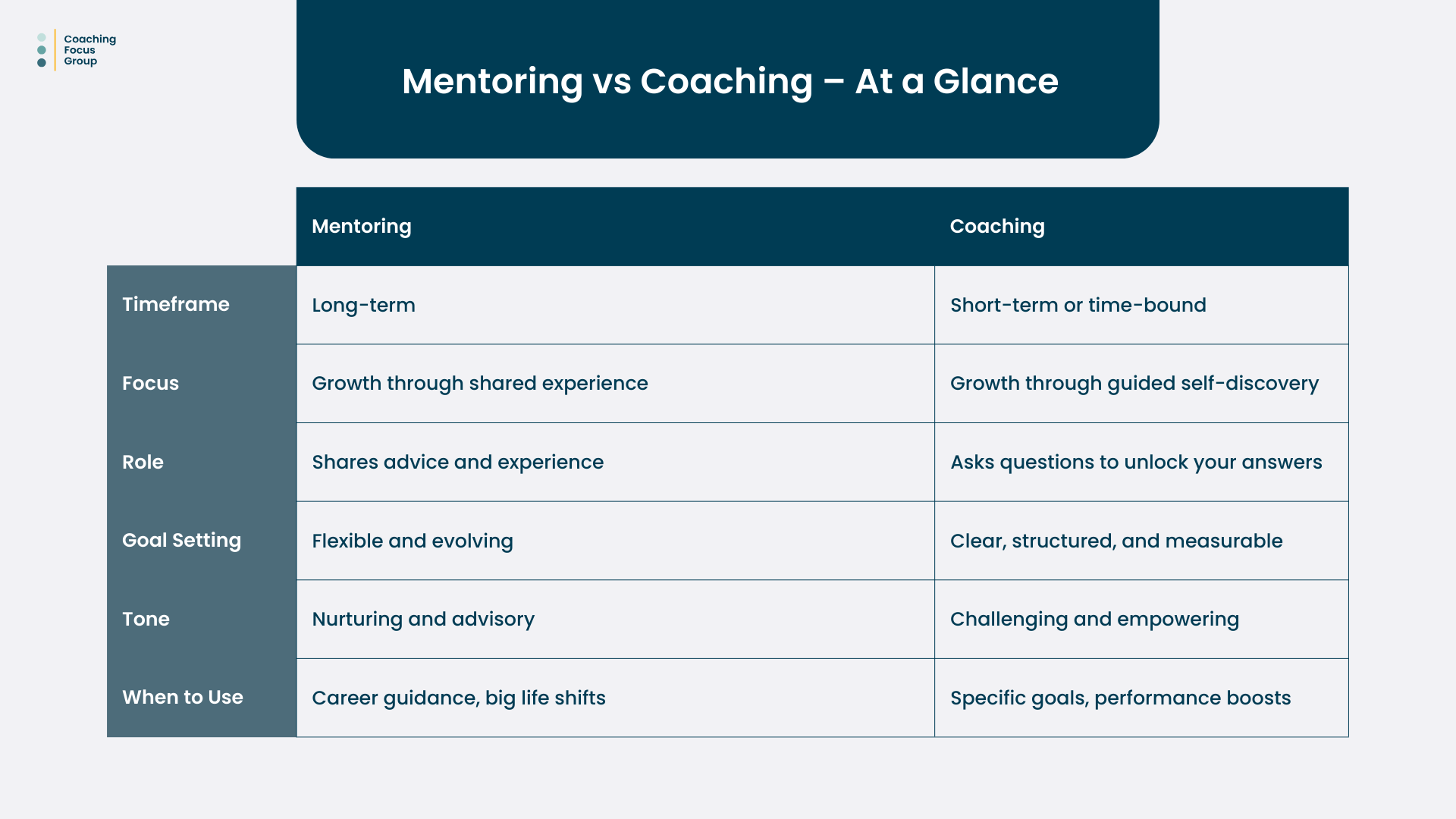Mentoring vs Coaching – What’s the Real Difference?

We’ve seen it time and again. Mentoring and coaching often get bundled together like they’re the same thing. They’re not. Sure, both help people grow. Both aim to bring out someone’s best. But how they do that? Completely different.
And that difference matters. We’ve worked with teams where the wrong approach held people back... and where the right one unlocked something brilliant. So if you want your support to really land, and to actually help someone move forward, it’s worth knowing when to mentor and when to coach.
What is Mentoring?
Mentoring is typically a long-term relationship where a more experienced person supports someone with less experience. A mentor uses their own knowledge, insights, and lived experience to guide, advise, and encourage their mentee.
This is about more than just workplace skills. Mentoring often touches on confidence, mindset, and even life outside the office. A great mentor will:
- Share personal experiences to help the mentee navigate challenges.
- Offer advice based on real-world situations.
- Provide encouragement and reassurance when things get tough.
The trust built in mentoring relationships runs deep. Mentees know they can turn to their mentor not just for answers, but for perspective, reassurance, and wisdom.
What is Coaching?
Coaching, by contrast, is usually a shorter-term, goal-focused relationship. A coach doesn’t need to have walked the same path as you. Their expertise lies in asking powerful questions, listening deeply, and helping you uncover the answers within yourself.
Coaching is about unlocking your potential by:
- Encouraging self-reflection.
- Helping you set clear, measurable goals.
- Challenging you to think differently and explore new options.
Rather than giving you the solution, a coach helps you discover it. This approach builds confidence, independence, and a stronger sense of ownership over your growth. Learn more about how to be a Coaching style leader.

Key Differences Between Mentoring and Coaching
Think of mentoring as guidance from someone who’s “been there, done that.” Think of coaching as a process to help you “find your own way forward.”
Mentoring = long-term development + shared wisdom
Coaching = short-term clarity + questions, not answers
Here’s a quick breakdown:
We’ve seen just how powerful mentoring and coaching can be. Both are built on trust, deep listening, and truly believing in someone’s potential. The best leaders we’ve worked with know when to lean into each and it makes all the difference.
Why Understanding the Difference Matters
If you use mentoring when coaching is needed, you risk giving advice when the person actually needs to find their own way. If you coach when mentoring is needed, you might miss the chance to share valuable insights that could save time and energy.
By understanding the difference, you can:
- Offer the right kind of support at the right moment.
- Build stronger relationships based on trust and clarity.
- Achieve better results, faster.
When to Use Mentoring vs Coaching
Choose mentoring when someone needs long-term support, guidance from your experience, or a sounding board for big decisions.
Choose coaching when someone has a clear challenge or goal and needs help unlocking their own thinking to move forward.
FAQs About Mentoring and Coaching
1. Can someone be both a mentor and a coach?
Absolutely. Many leaders switch hats depending on what’s needed. The trick is being clear on which approach you're using and why.
2. Is coaching always short-term and mentoring long-term?
Not always. Coaching is often project- or goal-focused, so it tends to be shorter. Mentoring relationships can last years. But both can flex based on the person and the purpose.
3. Do mentors need to be experts in your field?
Ideally, yes. A mentor’s value comes from lived experience. They’ve navigated similar paths and can offer tried-and-tested insights.
4. Can a coach give advice like a mentor?
That’s not their role. A coach is there to guide thinking, not give the answers. They help you build your own clarity and confidence. See how to lead in the new world of work.
5. How do I know which approach someone needs?
Ask yourself: Do they need guidance from someone who's done it before? Or space to reflect and figure it out themselves? That'll steer you in the right direction.
Summary: Mentoring vs Coaching – Why It Pays to Know the Difference
Mentoring and coaching both empower people to grow but they do it differently. Mentoring leans on experience. Coaching draws out potential. The real magic? Knowing when to use each. Get that right and you’ll offer more meaningful support, build stronger relationships, and drive real development that sticks.

Trayton Vance
Trayton Vance is the Founder and Managing Director of Coaching Focus Group, one of the UK’s leading leadership coaching consultancies working with clients such as McDonalds, Beats by Dre, Paramount and many more.
Coaching Focus Group
Specialists in leadership coaching, workplace coaching programmes, and building coaching cultures that stick.
[FREE WEBINAR]
Feb 19 from 12pm to 1pm GMT

You might be interested in...


Employee Engagement Series












